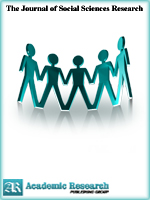The Journal of Social Sciences Research
Online ISSN: 2411-9458
Print ISSN: 2413-6670
Print ISSN: 2413-6670
Quarterly Published (4 Issues Per Year)

Archives
Volume 2 Number 4 April 2016
Time - A Speculative Article and a Suggested View
Authors: Samah Khaled Zahran
Pages: 82-87
Abstract
This is a speculative article, not a scientific paper, about the time as interdisciplinary topic. I presented my view, in the light of current and brief findings in physics and psychology fields. I presented the “problem of time”, in the light of theoretical view; as we have no independent conception about time. We define time by comparing one standard motion against another. Human cultures also, emphasis on the present moment as everything, in spite of the ability of human brain to travel back and forward through the past and the future. Then, I suggested my view in the light of previous background; logically and philosophically. I suggested time as moment, as dependent definition, instead of attributing it to duration, succession or motion. In addition, I suggested replacing “moment-point” by “space-time”, all tenses are co-existing, and semi-blocked universe instead of blocked one, then the importance of this perception, in the light of my current suggested view.
Gender Disparity in Water Policy Decision-Making and Status of Water Supply in Sokoto, North-Western Nigeria
Authors: Magami I. M. ; Ibrahim S.
Pages: 77-81
Abstract
The importance of involving both women and men in the management of water and other related issues has been recognized globally. This paper was aimed to evaluate gender disparity among decision makers in water issues and shortage of water supply in Sokoto. The methodology used was said to rely on internet , phone calls, interviews with Sokoto Ministry of Water Resources staff and as well as the use of questionnaire. From the results obtained it was discovered that gender disparity exist and lack of women education has contributed a lot to this disparity. In which 40% of the female respondents has no any formal education while the same 40% has only attended primary school. But for the male respondents there was 0% in both those with no formal education and primary school. In fact 15.3% of the male respondents have obtained a postgraduate studies. On the shortage of water supply and its quality challenges in Sokoto, was found to be a problem. The responses from the respondents indicated that 92 % of the female agreed its government responsibility to supply water, while 94.7% of the male respondents also concur. But only 42.7% of the female respondents agreed their water was adequate in supply, while 44.7% male respondents also agreed it’s adequate. On the participation of the respondents on water policies, 95.3% of the females have never participated in any water policy decision making, while 49.3% males have participated in water policies. In conclusion there is a huge gap in gender disparity among water policy decision makers and water supply is not in adequate supply. Therefore educating girls was found to be lacked behind, in which very few proceed after primary or secondary school level. And they need to be educated so that they can be found in every sector of government especially water, there by involving them in various decision-making to contribute their coater.
Mathematics for Every Day Living: The Cartesian Product As a Selection Tool
Authors: Agashi Pius P ; Okpanachi David
Pages: 74-76
Abstract
The paper is an attempt on how mathematics can be used as an instrument for everyday living. Drawing from hypothetical illustrations, the paper highlighted situations involving paired selection and the various commonly used approaches involved in the process. From these approaches, some shortcomings were observed and this created the need to explore a better and fairer alternative. This alternative was seen in the Cartesian product, a topic in Set Theory. Hypothetical illustrations were given on how the Cartesian product can be used as a fair instrument in a paired selection process. The submission is an eye opener to the mathematics teacher as the paper made some recommendations, one of which is that the teacher should strive to create a nexus, during instruction, between every topic in mathematics and its every day application.



